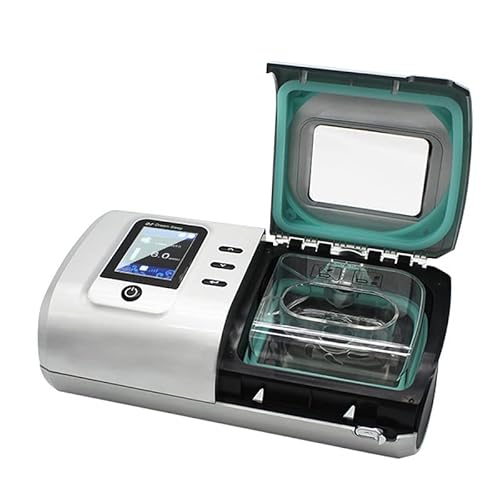Does Cpap Machine Help with Weight Loss?
Many people ask does CPAP machine help with weight loss because sleep apnea severely disrupts the body’s metabolic and endocrine systems. While the machine doesn’t directly burn calories, consistent use is a critical, foundational step toward restoring the body’s natural energy balance and achieving weight management success.
No, a CPAP machine does not directly cause weight loss, but it serves as a critical facilitator for successful weight management efforts. Does Cpap Machine Help with Weight Loss is a common query because Obstructive Sleep Apnea (OSA) profoundly disrupts the body’s metabolic function and energy regulation. Consistent use of CPAP (Continuous Positive Airway Pressure) therapy corrects these systemic disruptions, enabling patients to combat extreme fatigue and hormonal imbalance that often prevent them from adhering to effective diet and exercise plans necessary for shedding pounds.
🛒 Recommended Product
The Vicious Cycle of Sleep Apnea and Weight
The relationship between weight gain and sleep apnea is often circular, creating a challenging cycle for patients. Excess weight, particularly around the neck, increases the likelihood of developing or worsening obstructive sleep apnea. Conversely, untreated sleep apnea makes losing that weight significantly harder due to specific physiological changes.
Untreated sleep apnea causes repeated episodes of low blood oxygen (hypoxia) and triggers frequent micro-arousals during the night, preventing restorative deep sleep. This chronic stress and sleep fragmentation lead to severe downstream effects:
Hormonal Disruption
Sleep loss directly impacts the hormones that control appetite and satiety. According to clinical studies dating back to the early 2000s, insufficient sleep causes a critical imbalance:
- Ghrelin (The Hunger Hormone): Levels surge in sleep-deprived individuals. High ghrelin leads to increased cravings, particularly for high-carbohydrate and high-calorie foods.
- Leptin (The Satiety Hormone): Levels decrease when sleep is poor. Leptin signals the brain that the stomach is full. When leptin levels are low, individuals feel constantly hungry, resulting in higher caloric intake.
Increased Fatigue and Decreased Activity
The most recognizable symptom of OSA is excessive daytime sleepiness (EDS). When individuals are constantly exhausted, they are less likely to participate in physical activity. Even simple activities like household chores or walking the dog become strenuous tasks. This reduction in daily energy expenditure (NEAT—Non-Exercise Activity Thermogenesis) slows down metabolism and decreases the body’s overall caloric burn. For weight loss to occur, a caloric deficit is essential, and fatigue severely undermines the ability to create that deficit.
Restoring Balance: The Metabolic Benefits of CPAP Therapy
CPAP therapy delivers pressurized air through a mask, keeping the airway open during sleep. This eliminates apneas, stops oxygen desaturation, and restores the deep, restorative sleep cycles (REM and NREM stages). The resulting improvements directly address the underlying metabolic issues tied to weight struggles.
Normalizing Metabolism and Hormones
When CPAP successfully manages OSA, the body is no longer under chronic nightly stress. Research confirms that effective sleep apnea treatment helps reset the endocrine system:
🛒 Recommended Product
- Ghrelin/Leptin Normalization: Within weeks of starting consistent CPAP use, patients often report a measurable decrease in intense food cravings. Clinical data shows that the ratio of Ghrelin to Leptin improves, signaling to the body that it is satiated, thus naturally reducing excessive caloric intake.
- Insulin Sensitivity: Untreated OSA is a known risk factor for Type 2 Diabetes because hypoxia increases inflammation and makes cells resistant to insulin. Effective sleep apnea treatment, utilizing the CPAP machine, has been demonstrated to improve insulin sensitivity, making it easier for the body to process sugars and regulate blood glucose levels.
Improved Energy and Willpower
Perhaps the most significant indirect benefit is the return of high energy levels. When daytime fatigue disappears, patients are motivated and capable of engaging in sustained exercise. Moreover, adequate sleep improves cognitive function and self-control. Weight management requires constant decision-making regarding food choices, meal timing, and impulse control—all functions tied to the frontal lobe, which is negatively affected by chronic sleep deprivation. With improved sleep quality, patients have the mental clarity and willpower to stick to dietary goals.
CPAP as a Tool for Weight Management Success
Does Cpap Machine Help with Weight Loss? Yes, but only when viewed as one component of a comprehensive health strategy. The machine is not a weight loss shortcut; it is a necessary medical intervention that corrects systemic barriers to weight loss.
The Role of Adherence
For the CPAP machine to aid in weight loss, adherence is paramount. Experts recommend using the machine for at least four hours per night, though maximizing usage (7+ hours) yields the greatest metabolic benefits. When adherence is inconsistent, the symptoms of fatigue and hormonal imbalance quickly return, undermining any progress made.
Key Lifestyle Factors
CPAP therapy acts as the foundation, but sustainable weight loss still requires active effort in two primary areas:
| Area of Focus | Untreated OSA Symptoms | CPAP Therapy Benefits |
|---|---|---|
| Dietary Control | Intense carb cravings, poor impulse control, increased Ghrelin | Improved satiety, reduced cravings, mental clarity for planning |
| Physical Activity | Severe fatigue, inability to sustain exercise, high injury risk | Significantly higher energy levels, improved stamina, desire to move |
| Metabolic Health | Insulin resistance, high blood pressure, inflammation | Normalized blood sugar, lowered cardiovascular risk, reduced systemic stress |
For many individuals battling sleep apnea, successful weight loss attempts often only begin after CPAP therapy has been initiated and consistently utilized. The increase in available energy allows patients to transition from sedentary behavior to routine physical activity, finally creating the caloric deficit needed to achieve their goals.
🛒 Recommended Product
A CPAP machine is not a diet tool, but it is an essential foundation for treating the underlying health issues associated with sleep apnea and achieving long-term weight management success. By restoring metabolic function and energy levels, CPAP therapy empowers individuals to take control of their lifestyle and overcome the unique challenges posed by obstructive sleep apnea.
Scientific References & Research
The following peer-reviewed research papers provide additional scientific context:
-
K Askland et al. (1996).
Educational, supportive and behavioural interventions to improve usage of continuous positive airway pressure machines in adults with obstructive sleep apnoea
[External Link] -
RG Hooper (2020).
CPAP therapeutic options for obstructive sleep apnea
[External Link] -
SS Dickerson et al. (2006).
CPAP devices: encouraging patients with sleep apnea
[External Link]
Note: External research links are provided for educational purposes and do not necessarily represent endorsement.
Frequently Asked Questions About Does Cpap Machine Help with Weight Loss?
Q. How does treating sleep apnea with CPAP influence metabolic hormones related to weight?
A. Untreated sleep apnea disrupts sleep, elevating stress hormones and negatively impacting insulin sensitivity, often leading to weight gain and difficulty losing weight. Effective CPAP therapy helps stabilize sleep cycles, which in turn aids in normalizing levels of ghrelin (the hunger hormone) and leptin (the satiety hormone). This hormonal balance reduces cravings and overeating, supporting easier weight management.
Q. Can poor sleep from untreated sleep apnea actually contribute to weight gain?
A. Yes, poor sleep quality is strongly linked to metabolic dysfunction and weight gain. When sleep is fragmented, the body produces more cortisol, which encourages fat storage, especially around the abdomen. Additionally, chronic fatigue reduces motivation for exercise and increases reliance on high-calorie foods for energy, creating a cycle that promotes weight accumulation.
Q. If someone loses weight after starting CPAP therapy, how long does it typically take to notice the difference?
A. Weight loss following CPAP initiation is often a secondary effect that varies greatly depending on lifestyle changes. However, many users report feeling more energetic and motivated within a few weeks to a couple of months, allowing them to start incorporating exercise and better eating habits. Significant, noticeable weight loss usually occurs gradually over several months as a result of consistent therapy combined with behavioral adjustments.
Q. Does using a CPAP machine make exercise easier, thereby supporting weight loss efforts?
A. Absolutely; one of the primary benefits of successful CPAP treatment is a substantial reduction in daytime fatigue and improved stamina. By ensuring proper oxygenation throughout the night, users wake up feeling more refreshed and less drained, making activities like walking, jogging, or gym workouts feel less strenuous. This increased capacity for physical activity is a crucial component in achieving and sustaining weight loss goals.
Q. Is CPAP therapy a substitute for diet and exercise when attempting to lose weight?
A. No, CPAP therapy is not a standalone weight-loss solution but rather a powerful tool that facilitates lifestyle changes. It treats the underlying sleep disorder that often complicates weight loss efforts by correcting metabolic and hormonal imbalances caused by sleep deprivation. For sustainable weight loss, CPAP must be combined with a caloric deficit created through healthy eating and regular physical activity.
Q. Why is maintaining consistency with CPAP use so important for achieving weight-related benefits?
A. Consistent CPAP usage ensures that breathing disturbances are minimized every night, allowing the body’s metabolic and hormonal systems to remain balanced and properly regulated. Intermittent use can negate the benefits, as fragmented sleep patterns return, leading to renewed fatigue and disruption of appetite-regulating hormones. Daily adherence maximizes energy levels and metabolic health, providing the foundation for successful long-term weight management.
Related Articles
What Is the Best Workout Machine for Weight Loss?
Trying to determine what is the best workout machine for weight loss? While several options deliver results, the rowing machine often provides the max…
Do Vibrating Weight Loss Machines Work?
Do vibrating weight loss machines work? The scientific data is clear: while these vibration therapy plates offer proven benefits like muscle stimulati…
Treadmill Workouts for Buttocks: Sculpt and Tone Your Glutes
Getting fit and shaping your buttocks can be challenging. Treadmill workouts might be the solution you need. Treadmill workouts are not just for cardi…
When you purchase a product through Amazon links on EllipticalKing.com, we may earn a small commission at no extra cost to you. This helps support the site and keep our content free.




